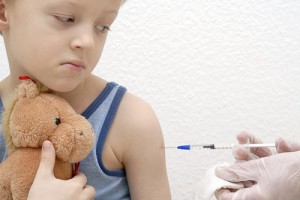Yet Another Court Agrees: Vaccines Do Not Cause Autism
Autism is a bad thing. Most people agree on that. For parents of children with autism, the fact that its causes are not fully understood can add frustration to an already difficult situation.
The highest court in Maryland recently ruled that expert testimony suggesting a link between vaccines and autism cannot be admitted under the relevant legal standard because (1) the witnesses were not qualified to testify as experts on epidemiology, and (2) the principles that the experts relied upon are not widely accepted in the relevant scientific field.
 This follows 3 rulings earlier this year by a special federal court set up specifically to handle lawsuits against vaccine manufacturers. In all 3 of those cases, the court found that the plaintiffs, even with a very relaxed standard of proof (preponderance of the evidence – essentially requiring only a showing that the evidence favors the plaintiffs by an iota), failed to demonstrate any link between vaccines and autism.
This follows 3 rulings earlier this year by a special federal court set up specifically to handle lawsuits against vaccine manufacturers. In all 3 of those cases, the court found that the plaintiffs, even with a very relaxed standard of proof (preponderance of the evidence – essentially requiring only a showing that the evidence favors the plaintiffs by an iota), failed to demonstrate any link between vaccines and autism.
While the causes of autism are not well-understood, multiple studies have ruled out some proposed causes. Most notably, the overwhelming majority of scientific evidence favors a conclusion that vaccines do not, in any way, cause autism. This has not stopped some individuals from repeating claims about the supposed link between vaccines and autism.
While the causes of autism are the subject of ongoing scientific debate, the benefits of vaccines are not: without question, vaccines have benefited the public health more than almost any other medical invention or discovery. Diseases such as measles, mumps, and polio, which once killed thousands of people (mostly children) per year, are now a distant memory for most of the developed world. Smallpox, which ravaged human populations for thousands of years, has been completely eradicated. Because of the smallpox vaccine, and a well-coordinated, worldwide effort, there has not been a confirmed case of smallpox anywhere in the world since 1978.
This can all change, however, even if a relatively small number of parents, no matter how well-intentioned, decide to stop vaccinating their children. Besides the obvious risks to which they’ve exposed their own children, they are endangering other children, as well.
You see, there are a small percentage of children in every population who cannot be vaccinated, either because they are too young, or they have an allergy to the vaccine. They rely on the immunity of those around them to keep them from being infected. This is a principle called “herd immunity” – in short, if a large percentage of individuals in a population are immune to an infectious disease, those few who are not immune also enjoy some measure of protection, because the disease is unlikely to gain a foothold in the population, reducing the risk that susceptible individuals will be exposed to it. As the rate of immunization decreases, the risk to everyone increases.
There are signs, however, that the anti-vaccination movement represents only a vocal minority. According to LegalMatch case statistics, of all the prospective clients seeking redress for injuries caused by defective drugs or medical devices, none of them has recently claimed autism as their injury.
This is a good sign – frivolous lawsuits linking vaccines to autism (like all frivolous lawsuits), devalue legitimate claims. And there are occasions, rare as they may be, when vaccines do cause injuries – the particular batch could have been defectively manufactured, or the doctor could administer it negligently, causing an infection or other injuries. These injuries deserve redress, but the risks of such injuries do not outweigh the benefits of vaccination.


Comments